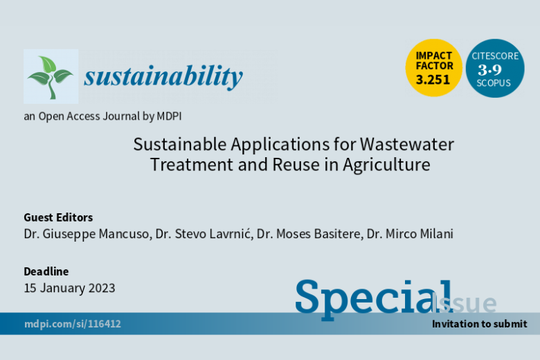Special Issue Information
Climate change is causing an irreversible modification of the hydrological cycle, leading to unpredictable water availability, exacerbating water scarcity, and contaminating water resources. Water scarcity is having a huge impact on agricultural irrigation, posing a severe risk to food production. The reuse of wastewater after proper treatment may offer a sustainable solution to face water scarcity, preserve quantity and quality of available freshwater, and recover value-added products.
The recent research and technological advances in the sector of wastewater treatment and reuse showed that a high level of quality effluent can be achieved, suitable for reuse in the agriculture sector. However, high treatment costs and environmental footprint might impede the future development of this area.
This Special Issue is intended to cover innovative, sustainable, and efficient technologies which can be used for contaminants removal and/or material recovery from wastewater in order to allow wastewater reuse in agriculture. The influence of wastewater reuse on irrigation networks and soil–water–plant system is also of interest.
To cover this theme, original research papers, review articles, and short communications on the following topics are invited:
• Innovative and low-cost wastewater treatment techniques
• Real-time and precise wastewater quality monitoring tools;
• Irrigation methods and strategies for wastewater reuse in agriculture;
• Effects of wastewater reuse on irrigation systems, soil quality, and crop growth;
• Fate and influence of conventional or emerging wastewater contaminants on agricultural irrigation;
• Raw materials recovery from wastewater and their utilization in agricultural production.
Other topics might be considered. The potential authors are invited to contact the guest editors for further information.
Keywords
• wastewater treatment
• wastewater reuse
• agricultural irrigation
• sustanaible technologies
• environmental remediation
• nutrient recovery
• emerging contaminants
• climate change
• water scarcity

